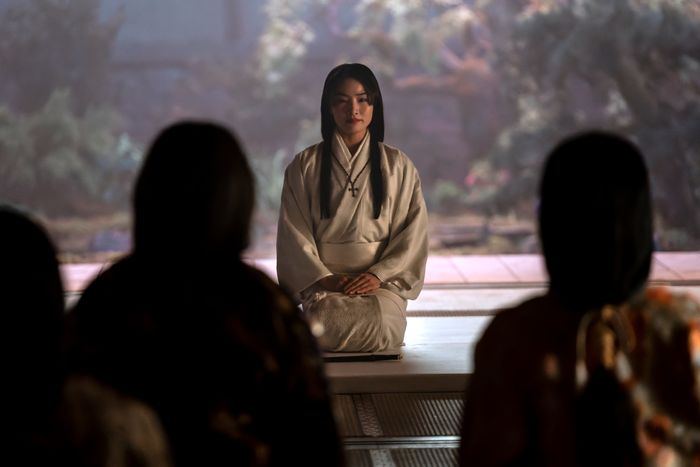
Subtitles: If we don’t read them, we cannot follow a show with dialogue in a language we don’t speak. If we do read them, we cannot also be looking at our phones. It’s absurd to point out such a superficial element of Shōgun, a series that drowns superficialities in a quicksand of layered meanings and reconsidered motives, but it’s an inescapable fact of the appeal and success of this show. In an era of series that thrive in the background, that do not require (or frankly, reward) excessive, careful attention, and that can coexist with multiple screens at once, Shōgun’s majority-Japanese dialogue makes the show phoneproof — or, at the very least, actively pushes against the impulse to glance elsewhere in the middle of an episode. When so much of the battle for viewership is about claiming attention, translation is Shōgun’s not-secret weapon.
Conversations around “prestige” TV — The Sopranos, The Wire, Mad Men — start from the sometimes implicit and sometimes very direct statement that they are unlike other series because they require more from the audience. They use dense storytelling, with dialogue often oblique or ambiguous; plotting that extends across several hours and avoids repetition; and characterization that’s more complex than hero/villain or comic relief. Shōgun exists in this lineage of admittedly violent, tragic shows (often about masculinity in crisis) that were more common a decade ago but have a harder time capturing broad public awareness now. They’re HBO Sunday-night-style dramas that feel rarer than ever in a post-Succession world. The Idol caught flack for its alleged behind-the-scenes drama, but it was barely a whisper on the discourse wind by the end of its season. Much of the buzz for True Detective’s fourth season stemmed from right-wing cultural backlash, with little of the rapt clue dissection the first season inspired. The Regime does not seem to exist. And on Shōgun’s home network, FX, The Bear has become the next nearest prestige attention show, but in keeping with current trends, it’s a half-hour comedy(?) rather than an hour-long drama. Attention for TV is hard to get and hard to keep.
Shōgun’s success in 2024 makes it an increasingly unusual example of a new hour-long drama that’s broken out into broader public awareness. Its premiere got over 9 million views within the first six days, making it Disney’s best worldwide debut for a non-Marvel or Star Wars show. It’s also part of the rise of a much broader category of entertainment for American viewers: non-English TV. In 2017, it felt notable that shows like Homeland and American Crime included any non-English scenes, even though they were relatively minor parts of those series. But the slow American embrace of non-English TV has been building for years, spurred by successes like the Danish shows Borgen and The Killing, K-dramas like Crash Landing on You and Moving, German series like Dark and Babylon Berlin, Japanese reality shows like Terrace House, Spanish dramas like Money Heist, and eventually cresting into a demand that turned Squid Game into a global sensation. By the time Shōgun premiered, being largely in Japanese was a big element of its press cycle, especially the challenge of writing scripts in English for extensive translation. It was scarcely mentioned as something that might scare audiences away.
But Shōgun’s attention-earning pleasure is not just because it’s largely in Japanese and most people have to put down their damn phones to follow it. Its thematic bedrock is about focusing carefully on precise interpretation and close reading. Some of its most beloved and arresting scenes are moments of translation between characters, as Blackthorne tries to decipher everything happening around him, his various Japanese translators declining to fully express his meaning to his interlocutors. The Shōgun memes are not about all the beheading or even Toranaga’s rise to power. They’re about the hilarious slippage between Blackthorne’s word choices and Mariko’s interpretation. The finale’s big closing gesture is not an enormous battle that sweeps across the landscape and secures Toranaga’s victory. Instead, it’s Toranaga and Yabushige talking through the potential future. What will it look like? What are everyone’s motives? Shōgun doesn’t need to actually reach that future point. Imagining it — describing it, explaining it, considering all the angles — is enough.
Like so many of its forebears in this space, Shōgun is a violent story about political intrigue in which women quietly influence and enact their own aims while ambitious men stand around outside chopping off heads. One analogy is Game of Thrones, which shares Shōgun’s sweeping scale and investment in supreme leadership. But it’s just as much in the mode of Deadwood, which is largely about people quietly talking to each other in rooms to suss out hidden motives and, whoops, sometimes someone has to die despite their outward profession of loyalty. Like Deadwood, too, so much of Shōgun’s storytelling is contingent on characters attempting to create action through language. The real prize in Shōgun’s world is land, but the currency is proclamations, oaths, information given and withheld, persuasion, and description. The power’s in the language and whether you’re paying close enough attention to wield it. Everything else is afterthought.
Correction: A previous version of this story incorrectly stated Money Heist’s country of origin.


